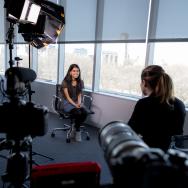If you encounter an environmental issue on the University of Chicago campus, chances are Phoenix Sustainability Initiative (PSI) is already working to improve it. From art installations, to on-campus composting, to a pop-up thrift shop to keep clothing out of landfills, the student organization is leading creative efforts to help build a better world.
“We want to get people who don’t already care about environmentalism to start caring,” said fourth-year Mercer Winer, PSI’s co-president.
Winer is one of the students who lead Phoenix Sustainability Initiative, which now brings together more than 70 members to spread awareness about the imminent threat of climate change and environmental degradation—and the dire consequences of inaction. Founded as a UChicago registered student organization in 2013, PSI has evolved into a “one-stop shop” for sustainability efforts, said Shannon Davis, fourth-year and co-president. Their goal is to make sure that sustainability is prioritized across campus and student daily life, not left as a separate, niche interest.
“UChicago students come from all over the country and the world,” said fourth-year Terra Baer, PSI’s vice president. “Composting, recycling and other habit-forming practices are conventions our global community is going to take with them when they leave. Our advocacy and dedication around these issues will radiate out into the world.”
PSI members are sorted into eight project groups—including Green Data, which conducts interdisciplinary, data-based research to empower the local community; Environmental Education, which educates K-12 students on environmental issues in Chicago Public Schools; and Science, Art and Sustainability, which is installing a new art piece inside the Logan Center that will repurpose discarded materials into an ocean-themed scene. Coordinating all these efforts requires frequent brainstorming sessions during weekly general meetings, as well as monthly check-ins with project group leaders. “We really are outcome oriented,” said Davis.
Some of PSI’s most recent projects have come to fruition just in time for Earth Day. Earlier this month, the organization launched a composting pilot program in the Renee Granville-Grossman Residential Commons. The first of its kind in a UChicago residence hall, the opt-in program offers participants a bucket (with a biodegradable liner and a lid) to collect food scraps and other compostable material inside their rooms. The goal is to stem the flow of waste “that would otherwise go into the trash,” said Baer, who helped establish the composting program.
Propelled by a $1,500 grant from the University’s new Green Fund, the pilot program, which involves about 20 students, is the result of partnerships with a variety of stakeholders on and off campus: the Office of Sustainability, Housing & Residence Life, and UChicago Dining, as well as The Urban Canopy, a local compost hauler. Each week, students empty their buckets into a bin set up in the residence hall lobby; from there, waste is transported to a nearby composting site. The effort comes on the heels of a successful composting program PSI initiated last year for students living off campus. If the pilot goes well, Baer hopes it can be scaled across other residence halls and on-campus buildings.
“These changes represent a valuable first step on the pathway to waste reduction and—hopefully—the implementation of composting more widely throughout campus,” said Baer. PSI has also worked with UChicago Dining on a plan to transition plastic utensils and bags to compostable replacements in Hutchinson Commons, Maroon Market, Midway Market and campus cafés. In addition, PSI has resumed work with student-run cafés to explore the composting of coffee grounds and other waste as well as a “bring-your-own mug” program, which had been stymied by the COVID-19 pandemic.
The organization has also found strategic ways to partner with other student organizations—including those that weren’t founded with an environmental focus. Last month, PSI collaborated with UChicago’s student-run fashion publication MODA Magazine on a three-day, pop-up thrift shop fundraiser held in the Reynolds Club to promote sustainable fashion and sustainability education.
“The goal was to create an on-campus location for people to donate unwanted clothing and divert it from landfills,” said Winer. With a 200-person line out the door on opening day, the event was “more successful than we could have ever imagined,” she added. As a result of the event, more than 1,000 pounds of clothing were collected and resold; proceeds of approximately $5,000 were donated to People for Community Recovery, an environmental justice organization based in Chicago’s South Side.
In addition to PSI’s on-the-ground gains in composting and waste reduction, Winer and Davis have collaborated this past year with UChicago’s Energy Policy Institute (EPIC) to establish the inaugural Sustainability Case Competition. The month-long competition—held in partnership with Ørsted, a global leader in offshore wind energy—challenges undergraduates to critically investigate a real-life problem focused on utility-scale renewable energy storage and work together to develop an operable, interdisciplinary, research-backed solution. The competition is open to all UChicago students, and offers participants opportunities for graduate student mentorship and professional networking. “By connecting with EPIC,” Davis said, “[we] have built a relationship that fosters creativity in addressing environmental problems and reciprocal communication between students and bigger actors of sustainability on campus.”
EPIC’s leaders have been impressed. “It has been immensely satisfying to watch the leadership team pull together PSI’s Case Competition,” said Marguerite Huber, EPIC’s communications and campus engagement manager who has met biweekly with Davis and Winer all year. “Their drive for a successful, organized, and meaningful event was prevalent in every aspect of their planning.”
“The University fully supports the vital efforts of the Phoenix Sustainability Initiative to strengthen the environmental health of our community,” said Michele Rasmussen, dean of students at UChicago. “For nearly 10 years, this group of forward-thinking students has worked hard to achieve tangible results that have undoubtedly made our campus a greener, more sustainable place to learn and live.”
Davis hopes that PSI’s recent successes have demonstrated the organization’s ability to implement sustainable change, and that this track record will help foster confidence in even more ambitious initiatives moving forward. In addition to new policies and strategies, the students wish to see the University further incorporate sustainability into courses across academic disciplines, including through labs and field work.
Although Baer, Davis and Winer have long been interested in environmentalism, their work in PSI has helped them put advocacy into action. The lack of urgent attention on the threat of climate change makes sustainability efforts all the more challenging, they said, but the students have found inspiration in their fellow members. As they prepare to graduate in June, they are eager to see what PSI continues to accomplish. “They’re an open, inclusive group of go-getters who see a problem and fix it with a ‘sky’s the limit’ mentality,” Davis said.
“Working alongside people with a similar drive and dedication and a diversity of knowledge and ideas gives me so much hope,” Winer added, “and makes the work seem so much more possible.”
—Visit the Phoenix Sustainability Initiative website to learn more about their work.

